Serbian Progressive Party
Serbian Progressive Party Српска напредна странка Srpska napredna stranka | |
|---|---|
 | |
| President | Aleksandar Vučić |
| Deputy president | Jorgovanka Tabaković |
| Parliamentary leader | Aleksandar Martinović |
| Founders | Tomislav Nikolić and Aleksandar Vučić |
| Founded | 21 October 2008 |
| Split from | Serbian Radical Party |
| Headquarters | Palmira Toljatija 5, Belgrade |
| Membership (2017) | 730,000[1] |
| Ideology |
Populism[2][3] Conservatism[4] National conservatism[5] Pro-Europeanism[6] |
| Political position |
Centre-right[7] to right-wing[8][9][10][11][12] |
| European affiliation | European People's Party |
| International affiliation | International Democrat Union |
| Colours | Blue |
| National Assembly |
90 / 250 |
| Assembly of Vojvodina |
46 / 120 |
| City Assembly of Belgrade |
57 / 110 |
| Party flag | |
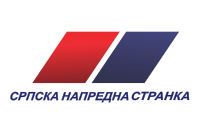 | |
| Website | |
|
www | |
The Serbian Progressive Party (Serbian: Српска напредна странка/Srpska napredna stranka or CHC/SNS) is a populist[13] conservative political party in Serbia.
Founded in 2008 as a split from the Serbian Radical Party (SRS), the culmination of a decade-long conflict within the SRS between the party's moderate and hard-line wings, the SNS managed to retain the former's national conservative outlook, while adopting distinct pro-European policies.
This combination has transformed the SNS into the current ruling party in Serbia, being the senior party in the current government coalition, the party's leader Aleksandar Vučić in turn serving as the President of Serbia. As of August 2018, the party holds 90 seats in the National Assembly.[14]
History
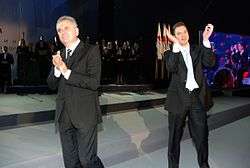
The Serbian Progressive Party was formed by a group of 21 former Serbian Radical Party (SRS) MPs led by Tomislav Nikolić. Disenchanted with the direction of the party, the pro-EU members[15] left and formed the Forward Serbia parliamentary group. The SNS was founded and held its first congress meeting on 21 October 2008.[16]
Of the Serbian Radical Party's representatives elected in the 2008 parliamentary election, 21 moved to the Serbian Progressive Party, while 57 remained in the SRS.
In 2011, the SNS formed a pre-election coalition with New Serbia, the Strength of Serbia Movement and the Movement of Socialists to participate in the 2012 election.[17]
In the 2012 parliamentary election, the party led the "Let's Get Serbia Moving" coalition and gained 55 seats out of 73 won by the coalition in the National Assembly. Party leader Tomislav Nikolić defeated Boris Tadić of the Democratic Party in the second round of the 2012 presidential election.[18]
Following his election as President of Serbia, Nikolić stepped down as leader of the party on 24 May 2012, leaving deputy president Aleksandar Vučić in charge until a successor was elected.[19] Vučić was the only candidate who ran for the party leadership, and was elected on 29 September 2012, with Jorgovanka Tabaković as his deputy.[20]
In December 2012, the People's Party led by ex-Mayor of Novi Sad Maja Gojković, merged into the SNS.[21]
The Serbian Progressive Party maintains cooperation with the Christian Democratic Union of Germany, Freedom Party of Austria[22] and United Russia party.[23] On 24 April 2013 the SNS' representatives in the Parliamentary Assembly of the Council of Europe joined the Group of the European People's Party.[24]
Presidents of the Serbian Progressive Party (2008–present)
| # | President | Born–Died | Term start | Term end | |
|---|---|---|---|---|---|
| 1 | Tomislav Nikolić | 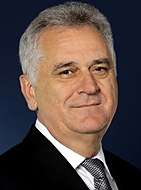 | 1952– | 21 October 2008 | 24 May 2012 |
| 2 | Aleksandar Vučić[nb 1] | 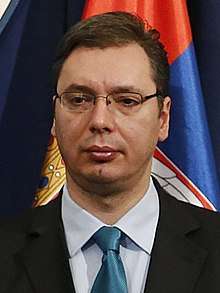 | 1970– | 24 May 2012 | Incumbent |
Electoral performance
Parliamentary elections
| Year | Popular vote | % of popular vote | # of seats | Seat change | Coalitions | Government |
|---|---|---|---|---|---|---|
| 2008 | N/A | N/A | 21 / 250 |
Split from SRS | opposition | |
| 2012 | 940,659 | 24.05% | 58 / 250 |
PS | government | |
| 2014 | 1,736,920 | 48.35% | 128 / 250 |
Big tent | government | |
| 2016 | 1,823,147 | 48.25% | 93 / 250 |
Big tent | government |
Years in government (2008– )

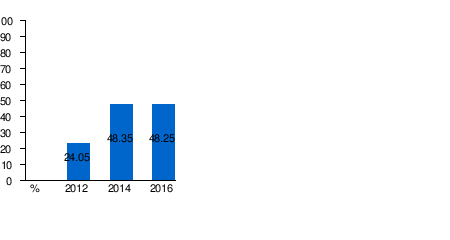
Presidential elections
| Election year | Candidate | 1st round votes | % | 2nd round votes | % | ||
|---|---|---|---|---|---|---|---|
| 2012 | Tomislav Nikolić | 2nd | 979,216 | 25.05% | 1st | 1,552,063 | 49.54% |
| 2017 | Aleksandar Vučić | 1st | 2,012,788 | 56.01% | N/A | — | — |
Positions held
Major positions held by Serbian Progressive Party members:
| President of Serbia | Years |
|---|---|
| Tomislav Nikolić | 2012–2017 |
| Aleksandar Vučić | 2017– |
| Prime Minister of Serbia | Years |
| Aleksandar Vučić | 2014–2017 |
| Ana Brnabić | 2017– |
| President of the National Assembly of Serbia | Years |
| Nebojša Stefanović | 2012–2014 |
| Maja Gojković | 2014– |
| Governor of the National Bank of Serbia | Years |
| Jorgovanka Tabaković | 2012– |
| President of the Government of Vojvodina | Years |
| Igor Mirović | 2016– |
| Mayor of Belgrade | Years |
| Siniša Mali | 2014–2018 |
| Zoran Radojičić | 2018– |
See also
Notes
- ↑ Acting party leader until 29 September 2012
References
- ↑ "RAT U SNS: Stefanović napao članove SNS da su interesdžije, treba slepo da slušaju Vučića jer su niko i ništa bez njega!". 15 June 2017. Retrieved 15 June 2017.
- ↑ "After Austria election, a look at Europe right wing parties". Retrieved 24 May 2016.
- ↑ "Serbian political outline". Retrieved 28 April 2017.
- ↑ https://www.reuters.com/article/us-serbia-president/serbias-conservative-leader-sworn-in-as-president-idUSKBN18R1QI
- ↑ Nordsieck, Wolfram (2016). "Serbia". Parties and Elections in Europe. Retrieved 27 August 2018.
- ↑ http://www.balkaninsight.com/en/article/who-is-who-political-parties-in-serbia
- ↑ "Serbia election: Pro-EU Prime Minister Vucic claims victory". BBC. Retrieved 25 September 2016.
- ↑ Thompson, Wayne C. (2013). Nordic, Central, and Southeastern Europe 2013. Rowman & Littlefield. p. 444.
- ↑ Slavic, MIsha (2014). Serbia. Nations in Transit 2014: Democratization from Central Europe to Eurasia. Rowman & Littlefield. p. 548.
- ↑ "Ruling Progressive Party 'wins majority in Serbia poll'". BBC News. 16 March 2014.
- ↑ Kleibrink, Alexander (2015). Political Elites and Decentralization Reforms in the Post-Socialist Balkans: Regional patronage networks in Serbia and Croatia. Palgrave Macmillan.
- ↑ Blank, Stephen J. (2012). The Sacred Monster: Russia as a Foreign Policy Actor. Perspectives on Russian Foreign Policy. Strategic Studies Institute. p. 80.
- ↑ Post election Serbia: good news for the EU? | cepolicy.org
- ↑ "National Assembly of the Republic of Serbia - Political Parties". www.parlament.gov.rs.
- ↑ "Poll: Progressive Party is pro-EU, but its voters are not". B92. 18 April 2012. Retrieved 13 August 2013.
- ↑ "Nikolić party to be called "Serb Progressive"". B92. September 24, 2008. Archived from the original on September 28, 2008.
- ↑ http://pressonline.rs/sr/vesti/vesti_dana/story/199240/Predsedni%C5%A1tvo+NS%3A+Nikoli%C4%87+nosilac+liste+SNS-NS-PSS-PS.html
- ↑ "Tomislav Nikolić wins in presidential runoff". B92. 20 May 2012. Archived from the original on May 23, 2012. Retrieved 23 May 2012.
- ↑ "Serbia's new president quits as party leader". B92. 24 May 2012. Archived from the original on February 21, 2014. Retrieved 24 May 2012.
- ↑ "Progressives elect new leader, deputy leader". B92. 29 September 2012. Archived from the original on February 4, 2014. Retrieved 29 September 2012.
- ↑ "Maja Gojković: Narodna partija kolektivno prešla u SNS" (in Serbian). Blic. 3 December 2012. Retrieved 6 August 2013.
- ↑ Marcus Schneider (July 2011). "Tomislav Nikolic positioniert sich in Europa - Bündnis mit Österreichs Rechtspopulisten" (PDF) (in German). Friedrich-Ebert-Stiftung.
- ↑ "Agreement for cooperation between SNS and United Russia". SNS website. September 2011.
- ↑ "SNS becomes member of European People's Party". B92. 24 April 2013. Archived from the original on October 6, 2013. Retrieved 28 April 2013.
External links
| Wikimedia Commons has media related to Serbian Progressive Party. |